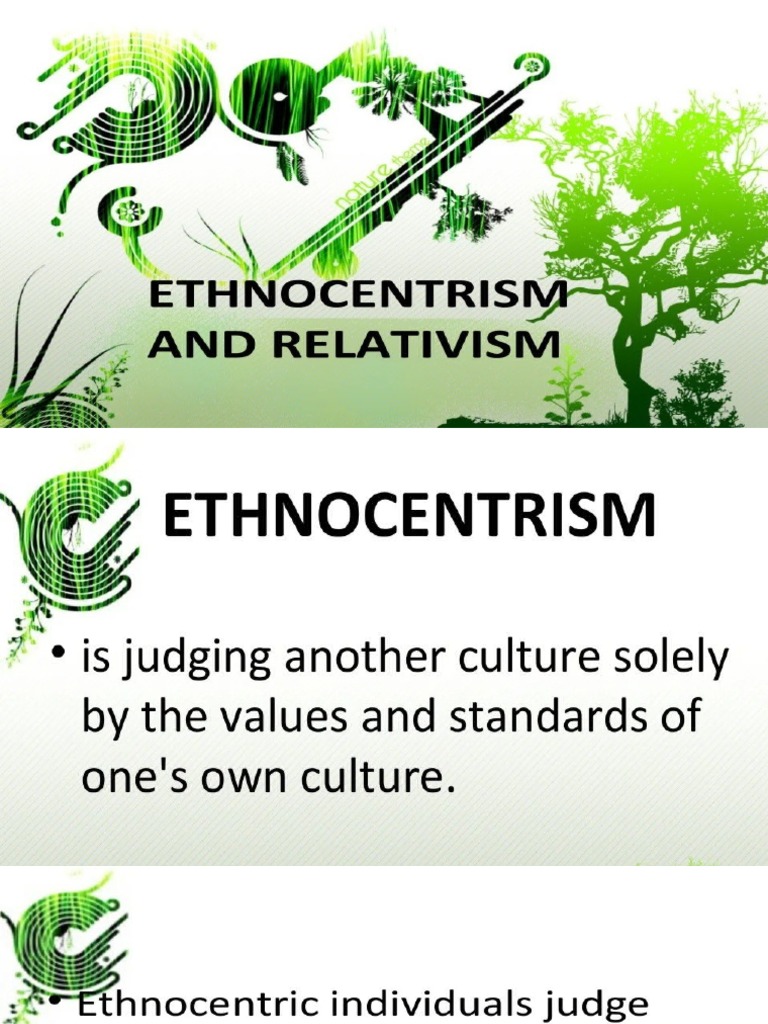In an increasingly interconnected world, the concepts of cultural relativism and ethnocentrism emerge as pivotal lenses through which we examine our interactions and perceptions of different cultures. These dual frameworks provoke fundamental questions about identity, morality, and the oft-embedded biases that shape our worldviews. As we navigate this nuanced terrain, one might pose a playful question: What if ethnocentrism is merely the echo of a fragile cultural identity struggling against the tides of pluralism? This inquiry leads us to a potential challenge: How can we cultivate a more open-minded perspective while acknowledging the intrinsic value embedded within various cultural narratives?
Cultural relativism advocates that a person’s beliefs and activities should be understood based on that individual’s own culture rather than be judged against the criteria of another culture. This principle promotes an appreciation for diversity and an understanding that norms and values are not universal but rather shaped by unique historical and social contexts. In stark contrast, ethnocentrism entails evaluating other cultures solely through the lens of one’s cultural standards, often leading to a distorted representation of those cultures. Thus, it creates a dichotomy that can perpetuate stereotypes and foster insular perceptions.
At the core of these concepts lies the recognition of subjectivity. Cultural relativism encourages us to shed our preconceived notions and appreciate that what may seem peculiar or unorthodox in one culture might be perfectly rational or imperative in another. Indeed, the complexity of human behavior and societal frameworks often defies simplistic categorizations. For instance, consider the collective communal living practices observed in various indigenous cultures. While such lifestyles may starkly contrast with the individualism revered in many Western societies, they embody a coherence and context that offers insights into sustainability, resource-sharing, and social cohesion.
However, this journey into relativism is not without its pitfalls. Unchecked cultural relativism may lead to moral ambiguity, creating a moral grey zone where harmful practices could be excused under the guise of cultural tradition. This phenomenon raises another compelling question: How do we strike a balance between respecting cultural nuances and criticizing practices that may violate universal human rights? These dilemmas illuminate the challenges posed by a relativistic stance, demanding an ongoing dialogue regarding the ethical implications of cultural practices.
Conversely, ethnocentrism can foster a sense of superiority amongst individuals and cultures, leading to the devaluation of other lifestyles and ideologies. This perspective is often rooted in historical contexts, where colonial ideologies fueled narratives of cultural dominance. Contemporary examples abound, revealing how ethnocentric views perpetuate systemic inequalities and conflicts. The Arab Spring, for instance, opened a dialogue regarding governance and civil rights in the Middle East, yet it was met with ethnocentric skepticism from segments of Western discourse that dismissed the movements as inherently flawed due to deep-seated cultural biases.
Understanding these dynamics forms the backbone of effective intercultural communication. A potent illustration could be found in the realm of environmental activism, where cultural relativism and ethnocentrism deeply influence one’s approach to climate action. The discourse surrounding indigenous knowledge systems, often seen as unscientific through an ethnocentric lens, reveals the intricate relationships these communities maintain with their environments. Their perspectives often advocate for sustainable practices honed over centuries, posing a critical challenge to the Western industrial paradigm that frequently extracts and exploits natural resources.
In practical terms, a cultural relativism-ethnocentrism continuum provides a framework for examining attitudes towards environmental policy and global initiatives. Those who embrace cultural relativism may advocate for collaborative stewardship practices that honor local knowledge, while those steeped in ethnocentric views may push for one-size-fits-all solutions based on Western scientific paradigms, often failing to consider the socio-cultural implications of their methods. This dissonance can either hamper global efforts to combat climate change or foster innovative solutions grounded in mutual respect and understanding.
Heightened awareness around these constructs encourages individuals to reflect on their biases and assumptions. As members of an interconnected global community, we must cultivate the skill of cultural humility—an approach characterized by a commitment to lifelong learning about other cultures, a respectful acknowledgement of cultural differences, and an openness to dialogue. By consciously engaging with the world around us, we can strive to dismantle the barriers erected by ethnocentrism while illuminating the shared values that unite diverse cultures.
In conclusion, as we grapple with the interplay between cultural relativism and ethnocentrism, we are tasked with fostering inclusive environments that celebrate multifaceted identities and viewpoints. The playful question posed earlier becomes more relevant as we consider the attitudes we hold and the implications they carry: Can we challenge our own cultural biases to emerge as better stewards of both the planet and humanity? Only through embracing this challenge will we be able to envision a future defined by a rich tapestry of cultural interactions that stand resilient against the existential threats posed by climate change.
